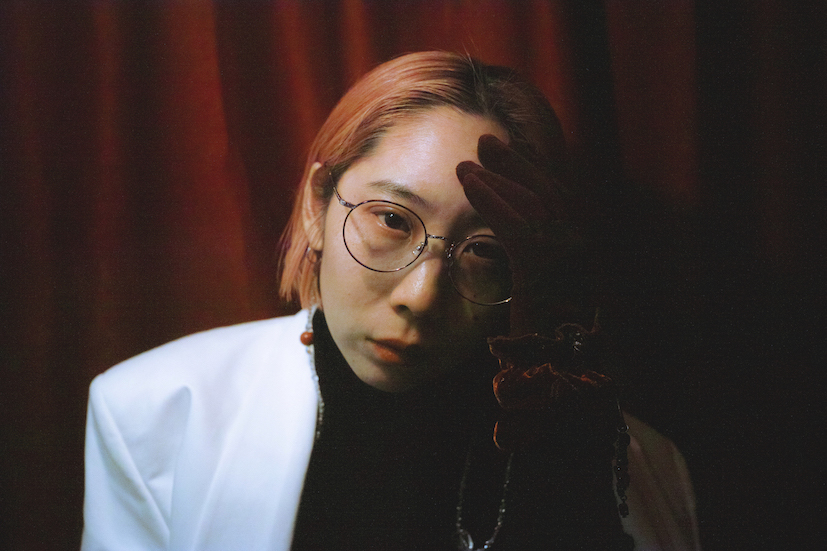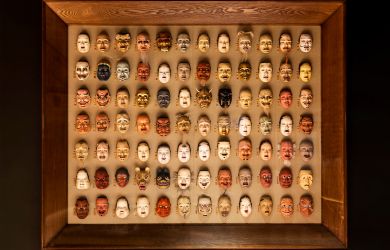
May 6, 2021
Embracing the Unconventional with Utena Kobayashi
How faith in a steel pan transformed a university dropout’s life
“When I quit university, I felt that the steel pan would bring me opportunities,” Utena Kobayashi recalls. “For me, it just wasn’t fun studying classical music to perform it with others like a disciplined army. I realized that I just like to listen to classical music — I still do now,” she tells Metropolis with a laugh.
“Unconventional” is a fitting adjective for Kobayashi. Everything from her life choices to the genre of music she plays and the red shock of hair she sports when meeting Metropolis all show she is not afraid of standing out, or shy to embrace her own way in life. And, as her debut album 6 roads suggests, that “way” can take the form of various paths and lead you in many unexpected directions.

Born in Nagano, Japan, Kobayashi’s decision to drop out of her music university in Kanagawa and pursue a career playing the steel pan set her apart from the masses of other Japanese students she saw around her. To many, it seemed like a risky choice she was making.
However, Kobayashi had a secret weapon to success: the steel pan. So far, she has certainly reaped success from her skill with the instrument, and has already joined a host of diverse Japanese musicians’ projects who are the hottest musicians in their genres, such as indie group D.A.N., rapper KID FRESINO and the Shuta Hasunuma Philharmonic Orchestra. “The steel pan is a Caribbean instrument meant to provide warm sounds,” she explains, “but working with those artists helped me establish my own style.”
In person, Kobayashi is more affable and warm than the cool and dark persona you imagine when listening to her debut album 6 roads. The album follows on from the past three EPs (Fenghuang, Darkest Era and Pylon), and was released on March 31, 2021. Each EP’s theme took part of a bigger narrative, telling the story of a protagonist who travels between two planets with different timelines to search for the meaning of life.
Sounds big? It is, and Kobayashi not only created the whole story and designed the art book to accompany the EPs, but also produced all the music itself. At its core, her much-anticipated album aims to celebrate life. “Life can be hard sometimes,” she says. “Sometimes we’re dragged down into the negative even if we want to stay positive. 6 roads might come across as too dark for celebration, but life goes on after all even if shit happens.”
The album, then, focuses on that courage we need to keep moving forward regardless of what life throws at us. “We stand right here at this moment in life after all the challenges we have overcome.”
The inspiration for the album came from a manga she had been reading. “Isn’t it amazing how decades-running manga stories like ‘One Piece’ are so well structured?” she beams. “One small thing foreshadows something bigger that will happen a few years later in the story. I wanted to copy this in my music, this idea of how bits of a story start connecting with each other and then go on to make sense much later in a narrative. Of course, I needed to write a story first to do that,” she laughs.
The art book was an important part of crafting this narrative. “I had to tell the painter everything precisely as it was in my mind, such as from which angle the sunshine comes through, where does the shadow go to or how long a tree stem lays across,” she continues. “I didn’t even think about it because it was just an abstract image in my head. But I realized that my perspective is only mine and that’s not how others see the world. Everyone has their own.
“There are still so many things and people around me that I haven’t paid attention to before. I thought that the process of knowing these people or learning new things is what could make our life fulfilling, rather than aiming higher by competing with other people. Because you can’t live alone. Expanding your circle of connections with others is important.”
Kobayashi predominantly plays the steel pan but in her solo projects she also dabbles in other instruments. The impactful opening track of 6 roads starts with Kobayashi’s smooth, choir-esque vocals, which sets up a tense and sacred atmosphere that is sustained throughout the entire album.
“My younger self was obsessed with Stanley Kubrick’s movie ‘Eyes Wide Shut.’ That scene where Tom Cruise is surrounded by a lot of masked people in the house was always my favorite. The music was scary and fascinating at the same time.”
Then there’s the dark, almost tribal track “雷雲” (which is read as Raiunn, meaning “thundercloud”) leading into the hard trance track “裂” (read as retsu, meaning “a crack”). Her creativity helped her invent intriguing track titles like “GONIA SE IIMIIX,” which reinforces the eccentricity of the album. However, it’s quite unexpected that EDM, such a mainstream genre of music, is a major influence for someone with such a classical background.
“I was into Skrillex a lot once and I like EDM. It sounds so free and different from the classical music I was learning at school,” she says. “I think EDM is the modern version of ancient music in the sense that people gather and reach a boiling point together in the sound. The only difference is whether people gather for a fire or a massive music festival.”
Although no shows have been announced yet to showcase Kobayashi’s album due to the coronavirus, she is positive about the future of her music. “I just bought an Irish harp which I’m very hyped about learning to play. I wonder what this new instrument will bring to my life?”
Check out the Utena Kobayashi’s website for more information and updates.
Listen to all of Tokyo’s latest tracks in our monthly roundups on the Metropolis Spotify
Love the Japanese music scene? Also check out:

KID FRESINO
The story of one of the hottest rappers in the Japanese music scene

TOSHI-LOW
How a punk band helped the post-tsunami community of Tohoku






